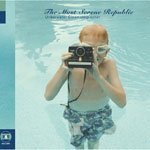
The Most Serene Republic Underwater Cinematographer
(Arts & Crafts)
When Arts & Crafts Records signed someone not born into (or out of) the inherent Broken Social Scene family, they initiated what we never foresaw from a membrane managed unofficially by the superpower collective. The Most Serene Republic came like miscalculated colour outside the lines of A&C, a label defined by a catalogue exclusive to BrSoSc and kin. With their band name tying all too closely to their monarchs, The MSR were like a paradigm for the utopian world order to emerge post the 'The Broken Social Scene Revolution', noted in history books under 'Marxism'. Popular critical consensus got busy pleading that The MSR were signed to emulate BrSoSc while on holidays:
"Look Bob, I just think they're dependable, creative, reliable individuals who will stay focused to carry on this legacy when our current contractors are at too steep of a liability to carry on."
But contrary to popular literary analysis (who wants that anyway), that rest of us embraced The Most Serene Republic in a hearty debate over peanut butter sandwiches, like little unbiased children should:
"I feel a rainbow of kaleidoscopic soap suds..."
"...reverberating over fallen transistor radios!"
And considering the routine popcorn transitions that seem to connect the disc in a long strain of dots, there's a constant threshold of paint waiting to regurgitate itself from the bottle, crayon wax melting with desire and dehydrated watercolours yearning to become sporadic dollops of vibrancy. Attire consisting solely of an Ocean Pacific swimsuit may soon have you taking pictures underwater with an archetype Polaroid. The cinematic journey begins with Prologue (really?) like the soundtrack for staring into the glow-in-the-dark stars of your once 12 year old bedroom. Rain drop keyboards and wish-washy drum machine winds crash into the slapstick sunshine of Content Was Always My Favorite Colour, a song schizophrenically available to be segmented into phases. Initiated from the ground-splitting cue of "my world is thoroughly compressed into the pocket of the fuck else", the workout is ebulliently exhausting through all its staggering transitions, a (makeshift) selection including:
(3/5) CUE: "once in a while I look here on the lamppost by the dance along": grab your partner and gather round, take a floor stick and add a sound! (note: coy listeners may choose to simply clap along and say yeah). The track's abrupt shifts toggle over your taste buds in a convoluted, influent marriage that makes you realize why you love refined sugar.
The disc is fluent to this context, laced with repeated lyrical mantras and erratic verses that combine in (decadently) unholy juxtapositions. Prepare to seemingly crumble during the incisive repetitions of "Oh (God)," then again take form (locate organic chem notes of failed courses past) to the wretched hoard crying "why does the brain come down with the heart?". Preposition 61 and its Velvet Underground Reed/Tucker semblance parades into a cameo of neck-biting beat boxing and sensationalist bird cooing before the shouting (unity) of: "she took a sad song made it sadder!" The group's power in numbers validates why Flock of Seagulls were on to something with their band name in their otherwise obliterated musical significance.
Tailing off with the necessary isolationist anthem, The King of No One plays (complete with the distracted audience background fuzz) as the cliché epitome for a gig at a downtown crack hotel (OD on floor 8). The lethargically ambivalent track is stitched with satirical pity for the musical ambiance of a Hyatt lobby, a kind of sentiment that sorts into a long dark walk through a graveyard of lost sound samples, dead piñata heads, organs and little drum-and-hum eclectic notions, i.e. the Epilogue. This ends it (really?).
In terms of their semi-gargantuan collaboration, The MoSeRe's glistening yet refined turbulence comes across in direct contrast to the raw blemished beauty of BrSoSc. Their collision of sounds are easily discernible, their precision lush with meticulous fibres. In the spirit of evaluating "Guero" independent from "Odelay", they say it simply: "I've got a box of lots of nice crayons/pick a colour and it's yours/we'll dedicate our lives to the colour/we'll play our music till its gone." They've found co-operation like the visible intermingling of salad dressings. Shake that Zesty Italian, Padre.
4 May, 2006 - 22:00 — Tara Campbell